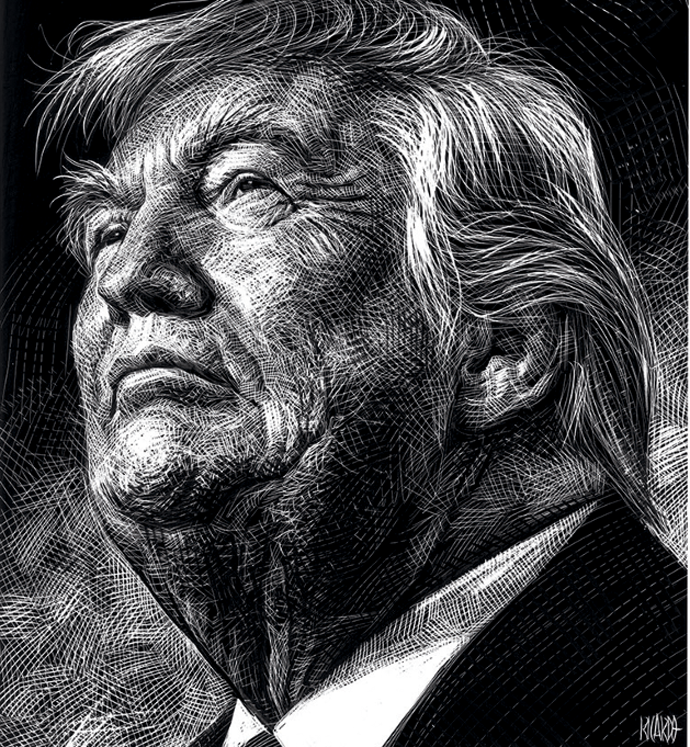The New Authoritarians Are Waging War on Women
Donald Trump’s ideological cousins around the world want to reverse the feminist gains of recent decades

When Americans look abroad these days, they see Donald Trumps everywhere: In Brazil, whose new president, Jair Bolsonaro, endorses torture, threatens to pull out of the Paris climate-change agreement, and suggests that his country was better off under military rule. In the Philippines, where President Rodrigo Duterte has overseen the extrajudicial killing of thousands of alleged drug dealers and threatened to impose martial law nationwide. In Hungary, where Prime Minister Viktor Orbán has quashed the free press, enriched his cronies, and stoked fear and hatred of refugees. In Poland, whose Law and Justice Party has undermined the independence of the supreme court. Even in Italy, whose leaders demonize immigrants, bash the European Union, and pal around with Steve Bannon.
But the more you examine global Trumpism, the more it challenges the story lines that dominate conversation in the United States.
Ask commentators to explain the earthquake that has hit American politics since 2016, and they’ll likely say one of two things. First, that it’s a scream of rage from a working class made downwardly mobile by globalization. Second, that it’s a backlash by white Christians who fear losing power to immigrants and racial and religious minorities.
Yet these theories don’t travel well. Downward mobility? As Anne Applebaum pointed out in this magazine just a few months ago, “Poland’s economy has been the most consistently successful in Europe over the past quarter century. Even after the global financial collapse in 2008, the country saw no recession.” In the years leading up to Duterte’s surprise 2016 victory, the Philippines experienced what the scholar Nicole Curato has called “phenomenal economic growth.” The racial-and-religious-backlash theory leaves a lot unexplained, too. Immigration played little role in Duterte’s ascent, or in Bolsonaro’s. Despite his history of anti-black comments, preelection polls showed Bolsonaro winning among black and mixed-race Brazilians. Racism has been even less central to Duterte’s appeal.
The problem with both American-born story lines is that authoritarian nationalism is rising in a diverse set of countries. Some are mired in recession; others are booming. Some are consumed by fears of immigration; others are not. But besides their hostility to liberal democracy, the right-wing autocrats taking power across the world share one big thing, which often goes unrecognized in the U.S.: They all want to subordinate women.
 To understand global Trumpism, argues Valerie M. Hudson, a political scientist at Texas A&M, it’s vital to remember that for most of human history, leaders and their male subjects forged a social contract: “Men agreed to be ruled by other men in return for all men ruling over women.” This political hierarchy appeared natural — as natural as adults ruling children — because it mirrored the hierarchy of the home. Thus, for millennia, men, and many women, have associated male dominance with political legitimacy. Women’s empowerment ruptures this order. “Youths oppress My people, and women rule over them,” laments Isaiah in the Hebrew Bible. “My people, your leaders mislead you.”
To understand global Trumpism, argues Valerie M. Hudson, a political scientist at Texas A&M, it’s vital to remember that for most of human history, leaders and their male subjects forged a social contract: “Men agreed to be ruled by other men in return for all men ruling over women.” This political hierarchy appeared natural — as natural as adults ruling children — because it mirrored the hierarchy of the home. Thus, for millennia, men, and many women, have associated male dominance with political legitimacy. Women’s empowerment ruptures this order. “Youths oppress My people, and women rule over them,” laments Isaiah in the Hebrew Bible. “My people, your leaders mislead you.”
Because male dominance is deeply linked to political legitimacy, many revolutionaries and counterrevolutionaries have used the specter of women’s power to discredit the regime they sought to overthrow. Then, once in power themselves, they have validated their authority by reducing women’s rights. In a 1995 paper, Arthur Gilbert and James Cole of the University of Denver observed that French revolutionaries made Marie Antoinette a symbol of the immorality of the ancien régime and that Iranian revolutionaries did the same to Princess Ashraf, the “unveiled and powerful” sister of the shah. After toppling the monarchy, the French revolutionaries banned women from holding senior teaching positions and inheriting property. Ayatollah Khamenei made it a crime for women to speak on the radio or appear unveiled in public.
Some of the revolutions of the Arab Spring followed a similar course. In their book, The Hillary Doctrine, Valerie Hudson and Patricia Leidl note that when the Muslim Brotherhood leader Mohamed Morsi replaced the longtime dictator Hosni Mubarak in Egypt, Morsi quickly announced that he would abolish the quota guaranteeing women’s seats in parliament, overturn a ban on female circumcision, and make it harder for women to divorce an abusive husband. After Muammar Qaddafi’s ouster, the first law that Libya’s new government repealed was the one banning polygamy.
Trump, Bolsonaro, Duterte, Orbán, and their ilk aren’t revolutionaries. But they, too, use gender to discredit one political order and validate another. Each describes the regime that preceded him as illegitimate: Trump claimed that Barack Obama wasn’t born in the United States and thus wasn’t eligible to be president under the Constitution. Bolsonaro and Duterte accused previous governments of tolerating unacceptable levels of crime. Poland’s Law and Justice Party claimed that its predecessors were beholden to Russia and the European Union.
In each case, Trump and his ideological cousins tied their predecessor’s illegitimacy to women’s power. And in each case, their efforts to denigrate and subordinate women cemented — for their supporters — the belief that the nation, having been turned upside down, was being turned right-side up.
It’s easy to see how this worked for Trump. He made Hillary Clinton — the first woman ever nominated for president by a major party — the personification of America’s corrupt political system. But rather than credibly promise to cleanse America of corrupting financial interests, he promised his supporters — the majority of whom told pollsters that America had grown “too soft and feminine” — a government cleansed of the corruption of one particular villainess.
Outside Trump rallies, vendors sold T-shirts showing Trump as a bare-chested boxer towering over a suggestively posed Clinton. trump 2016. finally someone with balls read one pin. Declared another: don’t be a pussy. vote for trump in 2016. Inside the rallies, crowds chanted “Lock her up,” a taunt never directed at Trump’s male primary rivals. Again and again, Trump responded to women who challenged him politically — Fox News’s Megyn Kelly, his rival presidential candidate Carly Fiorina, MSNBC’s Mika Brzezinski, Democratic Senator Elizabeth Warren — by calling them ugly. After his second debate with Clinton, he observed that she had “walked in front of me,” and “believe me, I wasn’t impressed.” The implication was clear: No matter how high a woman ascends, she’s ultimately just a body whose value is determined by men.
Commentators sometimes describe Trump’s alliance with the Christian right as incongruous given his libertine history. But whatever their differences when it comes to the proper behavior of men, Trump and his evangelical backers are united by a common desire to constrain the behavior of women. That alliance was consecrated during Brett Kavanaugh’s Supreme Court confirmation hearings, when Republicans raged against Judiciary Committee Democrats for supposedly degrading the Senate by orchestrating a public hearing for Christine Blasey Ford, who had accused Kavanaugh of sexual assault. At a rally, Trump took aim at Senator Dianne Feinstein of California, whom he called “another beauty” — at which point the crowd began chanting “Lock her up.”
To Brazilians, Filipinos, Hungarians, Italians, and Poles, this should all sound strikingly familiar. Bolsonaro, who ran for Brazilian president in 2018 against a backdrop of economic collapse (in 2016, Brazil’s economy contracted by more than 3 percent), political scandals (the jailing of a former president followed by the impeachment and removal of his successor), and rampant crime (in 2017, Brazil suffered almost 64,000 murders, close to twice as many as the United States and Europe combined), promised to return his country to its supposedly glorious past. “We want a Brazil that is similar to the one we had 40, 50 years ago,” he declared — even though 40 and 50 years ago, Brazil was a military dictatorship.
 Like Trump, Jair Bolsonaro (Photo right) linked this counterrevolution to a counterrevolution against uppity women. When, as a legislator, he voted to impeach Brazil’s first female president, Dilma Rousseff — who had been tortured by Brazil’s military rulers in the early 1970s — he dedicated the vote to one of that regime’s most infamous torturers. In 2015, he told a Brazilian congresswoman, “I would not rape you, because you are not worthy of it.” Crowds at Bolsonaro rallies chanted that they would feed dog food to feminists. And, like Trump, Bolsonaro has intense support from his country’s growing population of evangelicals, who appreciate his fervent opposition to abortion and gay rights.
Like Trump, Jair Bolsonaro (Photo right) linked this counterrevolution to a counterrevolution against uppity women. When, as a legislator, he voted to impeach Brazil’s first female president, Dilma Rousseff — who had been tortured by Brazil’s military rulers in the early 1970s — he dedicated the vote to one of that regime’s most infamous torturers. In 2015, he told a Brazilian congresswoman, “I would not rape you, because you are not worthy of it.” Crowds at Bolsonaro rallies chanted that they would feed dog food to feminists. And, like Trump, Bolsonaro has intense support from his country’s growing population of evangelicals, who appreciate his fervent opposition to abortion and gay rights.
In the Philippines, Duterte didn’t have an economic or corruption crisis to help him delegitimize the political order. But he used fear of drugs to depict the Philippines, in Nicole Curato’s words, as “a nation on the brink of disaster.” Like Bolsonaro, Duterte promised to restore the law and order his country had supposedly enjoyed during its autocratic past. A few months after taking office, he buried the remains of the longtime dictator Ferdinand Marcos, with military honors, in Manila’s Cemetery of Heroes.
Also like Bolsonaro, Duterte has threatened violence against women. In 2017, he informed Filipino soldiers that because he had declared martial law on the island of Mindanao, they could each rape up to three women with impunity. In 2018, he told soldiers to shoot female rebels “in the vagina,” because that would render them “useless.”
Duterte’s anti-feminist crusade — like Trump’s and Bolsonaro’s — has also featured the ritualized humiliation of powerful women. When Senator Leila de Lima demanded an investigation into Duterte’s drug war, he vowed to “make her cry.” The government then detained de Lima on drug-trafficking charges and leaked evidence supposedly proving, in Duterte’s words, that she was “screwing her driver” like she was “screwing the nation.” A congressman who would later become Duterte’s spokesman joked that de Lima wanted to be detained at an army base “because there are many men there.” Not even Duterte’s female vice president, Leni Robredo — a member of a rival political party — has escaped his taunts. At a public event in 2016, he noted gleefully that the skirts she wore to cabinet meetings were “shorter than usual.”
One can see parallels in Italy, whose deputy prime minister, Matteo Salvini, a Steve Bannon ally noted for his authoritarian tendencies, in 2016 compared the female president of the lower house of parliament to an inflated sex doll. The Italian government is promoting a law that critics say would eliminate child support, and a government spokesperson said forthcoming legislation would prosecute women who accuse their husbands of domestic violence if the husbands are not convicted.
Not all of the new authoritarians are this flamboyant. But they all link the new political order they seek to create to a more subordinate and traditional role for women. Orbán, who has accused his predecessors of permitting immigrants and Roma to undermine Hungary’s identity, has proposed “a comprehensive agreement with Hungarian women” to bear more children. He promotes debt-free education for women, but only if they have at least three children.
For its part, Poland’s autocratic government has run ads urging Poles to “breed like rabbits” and banned over-the-counter access to the morning-after pill. In late 2017, after Polish women protested draconian new restrictions on abortion, the government raided the offices of women’s groups.
For women’s-rights advocates, these sexist authoritarians pose a conundrum. Defeating them requires empowering women. Yet the more empowered women become, the more right-wing autocrats depict that empowerment as an assault on the natural political order. It’s no coincidence that Bolsonaro and Duterte are fervent critics of female former presidents, or that women were among Duterte’s and Trump’s principal opponents. Christine Blasey Ford’s allegations inspired women protesters to fill the U.S. Senate. Yet images of women yelling at male senators probably helped Republicans keep the Senate in the 2018 midterm elections. Assisted by the record number of Democratic women elected this fall, Nancy Pelosi will likely become speaker of the House again this January. But Pelosi herself has long been a convenient target for Republicans made anxious by the specter of feminist power.
Over the long term, defeating the new authoritarians requires more than empowering women politically. It requires normalizing their empowerment so autocrats can’t turn women leaders and protesters into symbols of political perversity. And that requires confronting the underlying reason many men — and some women — view women’s political power as unnatural: because it subverts the hierarchy they see in the home.
“The first [gender] difference that individuals notice,” Valerie Hudson told me, “is the difference between sexes in one’s own home. That establishes the first political order, the nature of how things should be in the country.” It is no surprise, therefore, that authoritarians often succeed when women — especially feminist women — threaten male dominance of public life in countries where men still reign in private.
Compare the United States, the Philippines, Brazil, Hungary, and Poland with the countries of northern Europe, where women’s political power has become more normal. In 2017, women made up 48 percent of Iceland’s parliament. In Sweden, the share was 44 percent; in Finland, 42 percent; and in Norway, 40 percent. In the countries that have recently elected gender-backlash authoritarians, the rates are lower, ranging from Italy’s 31 percent to Hungary’s 10 percent. This doesn’t mean a Nordic Orbán or Bolsonaro is impossible: Northern Europe has its own far-right parties. But it’s harder for those parties to use gender to delegitimize the existing political order, because women’s political empowerment no longer appears illegitimate.
It no longer appears illegitimate, in large measure, because gender equality has become more normalized in the home. In 2018, the Organization for Economic Cooperation and Development published the amount of time per day that women and men spent doing unpaid household chores such as cleaning, shopping, and child care. If you calculate the gender gap in each country, a pattern emerges. There is a striking correlation between countries  where women and men behave more equally in the home and countries where women are more equally represented in government. Take Sweden, 44 percent of whose parliamentarians are women. There, the gap between the amount of housework done by men and that done by women is less than an hour a day. In the U.S., where women will soon make up roughly 23 percent of Congress, the housework gender gap is an hour and a half. In Hungary, where women account for 10 percent of parliament, it is well over two hours.
where women and men behave more equally in the home and countries where women are more equally represented in government. Take Sweden, 44 percent of whose parliamentarians are women. There, the gap between the amount of housework done by men and that done by women is less than an hour a day. In the U.S., where women will soon make up roughly 23 percent of Congress, the housework gender gap is an hour and a half. In Hungary, where women account for 10 percent of parliament, it is well over two hours.
Women looking to unseat Trump or Bolsonaro in the next election may find little comfort in the Nordic example. Family dynamics change not year by year, but generation by generation. Nonetheless, the new authoritarianism underscores the importance of an old feminist mantra: The personal is political. Foster women’s equality in the home, and you may save democracy itself.
Fonte: The Atlantic




